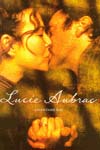Lucie Aubrac (R) No Rating
 French director Claude Berri once again revisits his country's past in his latest feature, "Lucie Aubrac." Set against the repressive backdrop of World War II France, the film chronicles one couple's relentless fight against Nazi occupation and their insistent struggle to stay together.
French director Claude Berri once again revisits his country's past in his latest feature, "Lucie Aubrac." Set against the repressive backdrop of World War II France, the film chronicles one couple's relentless fight against Nazi occupation and their insistent struggle to stay together.
Based on the autobiographical "Outwitting the Gestapo" by the real-life Lucie Aubrac, the film opens with the French Resistance wiring a German railway route for an explosion. Amongst those involved is Raymond Aubrac (Daniel Auteuil). After the sabotage, the film immediately cuts to a self-content Raymond resting peacefully next to his school teacher wife, Lucie (Carole Bouquet).
The tranquility does not last for long, however. At a covert meeting, Raymond and his comrades are arrested by the French secret police. Though the subversives are charged only with black marketeering, police suspicion runs deeper than their alleged crime.
Alerted to imminent crackdowns by the Gestapo, the Resistance calls another clandestine meeting. Once again, the Gestapo apprehends Raymond and his cohorts upon their arrival. Despite having a change of identity, Raymond' s involvement in the movement is nonetheless discovered. He is convicted of war crimes by the Germans and is sentenced to death.
After learning of Raymond's fate, Lucie undauntedly spearheads an effort to rescue her husband from execution. The second half of the film focuses on the schemes Lucie employs and the nerve she displays in order to achieve her goal.
The film's feminist subtext takes center stage as Lucie, armed with nothing but her guts and wits, takes on the Nazis. The gullibility of the Germans would render the film unbelievable if the events presented were fiction. However, knowing that the film is based on a true story makes Lucie's courage and will seem that much more extraordinary.
"Lucie Aubrac" is as much about documenting the heroism of the Resistance as it is about the intrepid will of its female protagonist. A seemingly tangential sequence at the beginning of the film craftily brings these two themes together. In the scene, Lucie is having a discussion with her class about the subordination of women in Mediterranean societies and the importance of history. The conversation serves to criticize the supposed inferiority of women and laments the forgetfulness of the past.
The dialogue between the teacher and the pupils undoubtedly mirrors director Claude Berri's own preoccupations with these themes. By telling the story of "Lucie Aubrac," Berri preserves the memories of the French Resistance and symbolically pays tribute to the strength and courage of previously unrecognized women.
* MPAA Rating: R, for violence.
'Lucie Aubrac'
Daniel Auteuil: Raymond Aubrac
Carole Bouquet: Lucie Aubrac
Eric Boucher: Serge
Patrice Chéreau: Max
Heino Ferch: Klaus Barbie
Released by USA Films. Written and directed by Claude Berri. Based on a book by Lucie Aubrac. Executive producer Pierre Grunstein. Director of photography Vincenzo Marano. Editor Hervé de Luze. Production designer Olivier Radot. Costume designer Sylvie Gautrelet. Running time: 1 hour, 55 minutes.
To get the full Quicklook Films experience, uncheck "Enable on this Site" from Adblock Plus
box office top 10

Challengers Released: April 26, 2024 Cast: Zendaya, Josh O'Connor 15M

Unsung Hero Released: April 26, 2024 Cast: Daisy Betts, Joel Smallbone 7.8M

Godzilla x Kong: The New Empire Released: March 29, 2024 Cast: Rebecca Hall, Brian Tyree Henry 7.2M

Civil War Released: April 12, 2024 Cast: Kirsten Dunst, Wagner Moura 7M

Abigail Released: April 19, 2024 Cast: Melissa Barrera, Dan Stevens 5.3M

The Ministry of Ungentlemanly Warfare Released: April 19, 2024 Cast: Henry Cavill, Eiza Gonzalez 3.9M

Kung Fu Panda 4 Released: March 8, 2024 Cast: Jack Black, Viola Davis 3.6M

Ghostbusters: Frozen Empire Released: March 22, 2024 Cast: Paul Rudd, Carrie Coon 3.3M

Dune: Part Two Released: March 1, 2024 Cast: Timothée Chalamet, Rebecca Ferguson 2M

Boy Kills World Released: April 26, 2024 Cast: Bill Skarsgård, Famke Janssen 1.7M






